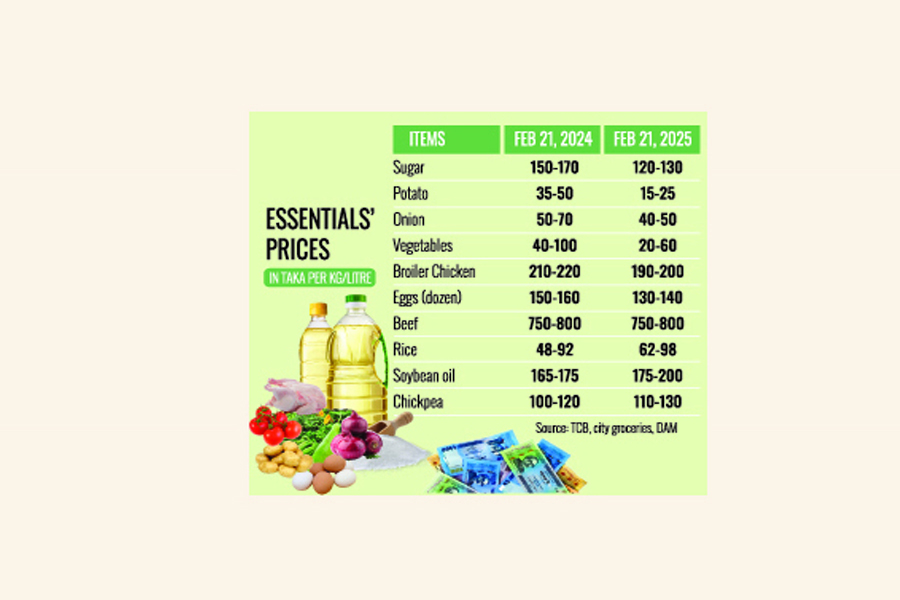
Published :
Updated :

As the holy month of Ramadan approaches, the prices of many essential commodities remain relatively static compared to previous years.
However, the soaring prices of rice, edible oil, and pulses continue to burden consumers, with the soybean oil supply running critically low in many grocery stores, according to kitchen market sources.
Ramadan, a time of heightened demand for staples like edible oil, rice, lentils, chickpeas, sugar, dates, and other fruits, often sees prices surge.
This year, however, many items have maintained static prices, except for rice, soybean oil, a few pulses, and imported fruits.
A visit to the market on Friday revealed that sugar is selling at Tk 120-130 a kg, significantly lower than last year's Ramadan prices of Tk 140-160 a kg.
Onions, another essential item, are available at Tk 40-50 a kg, thanks to the ongoing harvesting season, which was Tk 50-70 a kg in the corresponding period of last year.
Puffed rice, a popular Ramadan snack, is priced at Tk 90-120 a kg, similar to last year's rates.
Chickpeas are selling at Tk 110-130 per kg, slightly higher than last year's Tk 100-120 per kg.
Lentils, however, have seen a marginal increase, priced at Tk 120-145 a kg while khesari dal is selling at Tk 120-125 a kg.
Juel Rana, a grocer in Dhanmondi, said the prices of puffed rice might surge during Ramadan amid a hike in rice prices.
He said the prices of pulses increased notably two months back, but have started becoming normal.
Potato prices dropped by 40-50 per cent compared to last Ramadan. It is now selling at Tk 15-25 per kg across the country.
Winter vegetables like tomatoes, brinjals, pumpkins, cauliflower, cabbage, carrot, radish, cucumber, country bean, and bottle gourd are 30-40 per cent cheaper this year, according to kitchen market sources.
Despite the overall stability, the edible oil market remains volatile.
Soybean oil, a staple for cooking, is in short supply, with many stores running out of stock.
Some retailers are reportedly selling soybean oil at inflated prices of Tk 185-200 a litre, up from the government-fixed price of Tk 175 a litre.
Many distributors are allegedly selling five-litre bottle oil as loose oil at Tk 190-200 a litre.
Consumers expressed frustration over the artificial shortage, accusing suppliers of deliberately reducing supply to drive up prices.
"This is a tactic to put pressure on people's pockets during Ramadan," said Abidur Rahman Polash, a shopping mall salesman in Mohammadpur.
Rice prices, too, remain high, adding to the financial strain on poor households.
All kinds of rice have witnessed 15-25 per cent price surge in a year.
Coarse rice is hardly found in city groceries, and the few who have are selling it for Tk 60-62 a kg.
Medium-quality rice is available and being retailed at Tk 68-72 a kg, with the finer one selling at Tk 85-98 a kg.
Dates, a Ramadan essential, are available at varying prices.
Lower-quality dates are selling at Tk 250-300 per kg, while premium varieties range from Tk 450 to Tk 1,600 a kg.
Coarse date prices are static, but medium and finer quality dates have witnessed 25-30 per cent hike than last year, according to the Trading Corporation of Bangladesh.
The prices of protein sources like eggs, chicken, and beef remain static compared to last year.
Farm eggs are priced at Tk 130-140 a dozen, while broiler chicken sells at Tk 190-200 a kg.
Sonali and Pakistani chicken are retailed at Tk 320-330 a kg, Tk 20-30 less than last year.
Beef prices are so far static at Tk 750-800 a kg, similar to last year's rates.
Cultured fish prices are also static compared to last year, but river fish prices are 10-12 per cent higher, according to vendors in the city.
Consumers Association of Bangladesh (CAB) Vice President SM Nazer Hossain told The Financial Express the government's commendable efforts to reduce the prices of many essentials have been overshadowed by the ongoing volatility in the rice and edible oil markets.
He said rice prices have surged to a record high this year due to concerns over crop losses caused by flooding in 14 districts during July and August of 2024.
While the market now appears to have stabilised, the persistent fluctuations in edible oil prices remain a pressing issue, keeping consumers under financial strain, he said.
Nazer stressed the need for stricter market monitoring and greater accountability for edible oil refiners and traders to prevent unjustified price hikes and ensure fair pricing for consumers.
tonmoy.wardad@gmail.com


 For all latest news, follow The Financial Express Google News channel.
For all latest news, follow The Financial Express Google News channel.